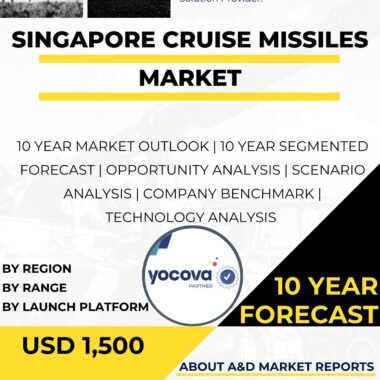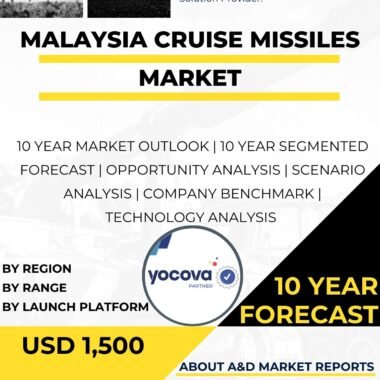Description
The defense actuation systems market in Spain is a critical and specialized sector within the country’s defense industry, playing a pivotal role in enhancing the performance and maneuverability of military platforms and equipment. Actuation systems are essential components that control the movement of various mechanical systems, such as aircraft control surfaces, missile guidance systems, and turret movements on armored vehicles. The reliability, precision, and responsiveness of these systems are crucial in ensuring the effectiveness of defense systems and the safety of military personnel.
The adoption and development of defense actuation systems in Spain are driven by several factors, including the need for advanced control and precision in modern defense platforms, the constant evolution of defense technologies, the demand for improved operational capabilities, and the country’s commitment to maintaining a credible defense posture.
The Spanish defense industry is actively engaged in designing, manufacturing, and integrating actuation systems for a wide range of military applications. Domestic companies, such as INDRA, SENER, and SAES, have developed expertise in actuation technologies, contributing to the development and modernization of Spain’s defense capabilities.
Aircraft actuation systems are crucial for ensuring the maneuverability and stability of military aircraft. These systems control various flight surfaces, including ailerons, elevators, and rudders, allowing pilots to precisely control the aircraft during take-off, flight, and landing. Actuation systems play a critical role in enhancing the agility and responsiveness of fighter jets, transport aircraft, and helicopters, enabling them to execute complex maneuvers and fulfill diverse mission requirements.
Spain’s defense industry has been involved in the development of actuation systems for the country’s indigenous aircraft, such as the Airbus A400M military transport aircraft. These systems ensure the optimal performance of the aircraft, contributing to its versatility and operational effectiveness.
Missile actuation systems are vital components of missile guidance and control. These systems provide the necessary thrust vectoring and steering capabilities to ensure accurate missile trajectory and target engagement. The precision and reliability of missile actuation systems are essential in ensuring the success of missile-based defense systems, such as surface-to-air and air-to-surface missiles.
Spain’s defense industry has contributed to the development of missile actuation technologies, collaborating with international partners and participating in multinational missile defense programs. These efforts strengthen Spain’s defense capabilities and enhance its ability to address various security challenges.
In naval applications, actuation systems play a critical role in the movement and positioning of various ship components, such as radar antennas, gun turrets, and propulsion systems. These systems enable naval vessels to operate effectively in various sea conditions, support multi-mission capabilities, and enhance the overall combat readiness of the Spanish Navy.
Spain’s naval shipbuilding industry, including companies like Navantia, has integrated advanced actuation systems into its modern naval platforms. These systems contribute to the agility and responsiveness of naval vessels, ensuring their effectiveness in defense and peacekeeping operations.
Land-based actuation systems are essential for armored vehicles, such as tanks and armored personnel carriers. These systems control turret movements, weapon systems, and vehicle stabilization, providing the necessary precision and control for engaging targets and maintaining operational readiness in challenging terrains.
Spain’s defense industry has been actively involved in the development of actuation systems for armored vehicles, collaborating with the Spanish Army and international partners to enhance the capabilities of its land-based defense systems.
The development and integration of defense actuation systems require ongoing research and innovation. The defense industry invests in research and development to improve actuation technologies, reduce weight, increase efficiency, and enhance durability. Additionally, advancements in materials, electronics, and control algorithms contribute to the continuous improvement of actuation systems.
Budgetary considerations are significant factors in the defense actuation systems market. Defense spending in Spain is influenced by economic conditions and government priorities, impacting the allocation of resources for research, development, and procurement of actuation technologies.
Moreover, Spain’s commitment to international arms control agreements and export regulations influences its approach to the defense actuation systems market. Ensuring compliance with international standards is essential for facilitating defense exports and maintaining positive relationships with partner nations.
Environmental sustainability is an emerging consideration in the defense actuation systems market. Spain’s defense industry, like others globally, is exploring eco-friendly materials and more sustainable manufacturing processes to align with the country’s commitment to environmental responsibility.
In conclusion, the defense actuation systems market in Spain is a critical component of the country’s defense industry. Actuation systems play a vital role in enhancing the performance, maneuverability, and precision of military platforms and equipment. Spain’s defense industry is actively involved in designing, manufacturing, and integrating actuation systems for various defense applications, including aircraft, missiles, naval vessels, and armored vehicles. Continuous research and innovation are essential for improving actuation technologies and maintaining Spain’s competitive edge in the global defense market. As Spain continues to invest in research and development and collaborates with domestic and international partners, the defense actuation systems market will remain a key focus in enhancing the country’s military capabilities and ensuring its readiness to address future security challenges.




